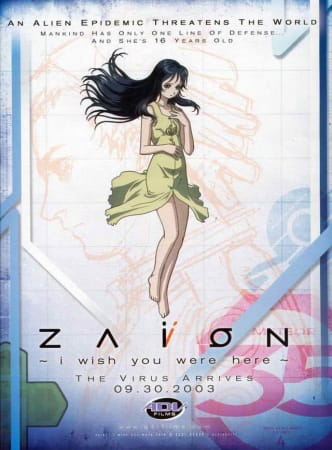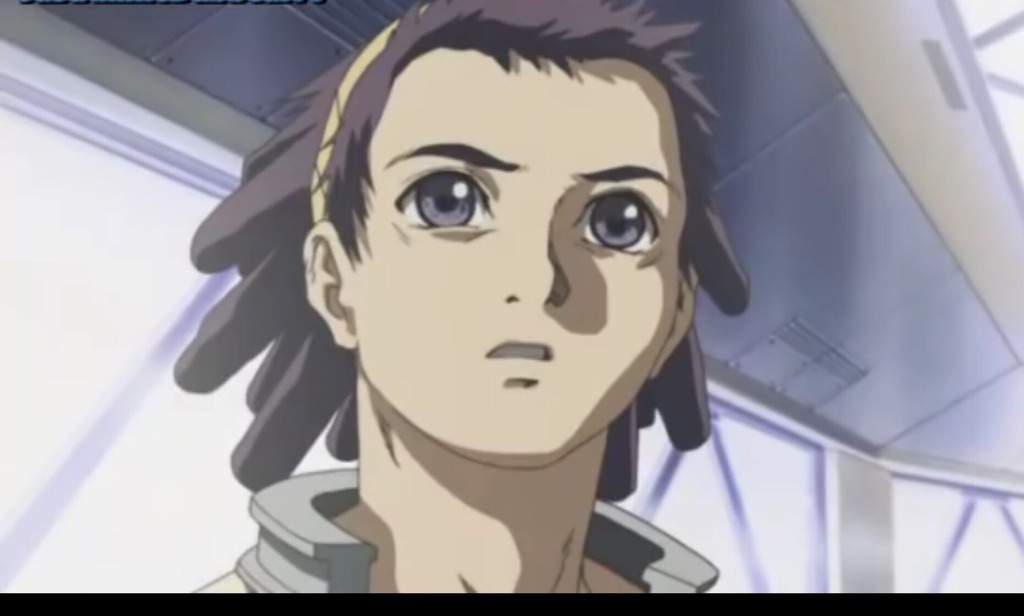Director: Seiji Mizushima
Screenplay: Hiroyuki Nakamura,
Manabu Ishikawa and Natsuko Takahashi
Voice Cast: Joe Odagiri as Yuji
Tamiya; Yukari Tamura as Ai; Daisuke Gouri as Domeki; Hiroaki Hirata as
Chanpua; Isao Yamagishi as Tatsumi; Jin Hirao as Kurosawa; Katsuyuki Konishi as
Kaneshiro; Kotono Mitsuishi as Mitsuki; Nobuo Tobita as Satake; Romi Park as
Tao; Tesshō Genda as Kudou
Viewed in Japanese with English Subtitles
Zaion is very much the project of a new company with too much
ambition, not enough resources. Studio Gonzo
were the anime studio I grew up with at their height in the 2000s as I got into
anime, so there is a certain aura to them that I cannot help to have in spite
of the obvious issues they had. The common idea, whether true or not, is that
they always start strong on the first episode of their TV series, a company
striving for the slicking productions, only for projects to suffer from budget
or having to create original material when the manga sources weren't finished,
something to attest to twice from my experience from Hellsing (2001-2) and Chrono
Crusade (2003-4). This narrative should be held to debate in reality. What
I can however say with true is how it's amazing to think that by the 2010s,
whilst they're still around, they crashed and burned due to financial
difficulties, having been founded in 1992, started anime production in 2000, and
ended up having to delist themselves in 2008 and being merged with another
company in 2009.
The best way to answer this
question for myself, whether Gonzo
were a good animation studio or one which failed, is only answerable by
actually watching their work from their main period, in which between 2000 to
2008 they were very productive. Zaion is a little different as, made in
2001, this is very early for the studio, just breaking into the industry in the
2000s as they originally began in video game animation, the same year as one of
their earliest big titles Hellsing.
It is also an "ONA", an early original net animation streamed
directly on the internet.
Zaion also unfortunately has similarities to Mars of Destruction (2005), a notoriously "bad" anime
OVA, if on a higher budget which is still a bad comparison for it. Like Mars of Destruction later, this is
about a meteorite landing on Earth and causing an alien outbreak to transpire,
in this case a virus that creates monsters from those infected. Unlike the later
anime where it's a group of schoolgirls with guns inexplicably having to deal
with them, this has a team pumped with nanobots in the blood stream that allow
them to transform into effectively a sentai team. A new project, a girl called
Ai with tremendous psychic powers, is planned to be the new secret weapon, but
alongside a burgeoning relationship between her and Yuuji, a member of the
team, the virus is evolving and starts to surpass the nanobots that protect
from them.
A four part ONA, it is pretty
standard material for a plot, but with the notable detail being that it's
directed by Seiji Mizushima. I liked Dai-Guard (1999-2000), a real surprise
in the transition to computer assisted animation about ordinary office
employees having to operate a giant robot, and he's known primarily for the
first adaptation of Full Metal Alchemist
(2003), which was a colossal boundary passing hit. Zaion, honestly, does feel like a job for hire, particularly as Zaion's biggest weakness is that story
wise and in available resources, it's incredibly bland and doesn't do anything
of interest with its basic material.
Even in knowledge that this was
an attempt at something from a newly created studio, it cannot be denied the
OVA feels impoverished. The plot is very conventional for anime, but if you add
style, any can grow in quality even in four TV episode length parts. You can
make even a generic premise grow. Zaion
isn't that anime, not particularly investing any real pathos for the cast,
including a bland snarky male lead, whilst the only character of note is one of
the scientists being a middle aged slob who eats a lot of junk food for his
main diet. Even the aliens aren't that inspired as, whilst a threat when they
can melt together into one giant alien or infect anyone who survives them,
there's a lack of any distinction between them.
Production wise this is felt too,
not in the obviously dated early effects, which stand out jarringly even in
terms of frame rate, but for how generic it is. This is particularly felt as,
barring one shot of a crowded city of pedestrians (in the day), this exists in
some of the most empty locations possible. Not since Mars of Destruction or even Ai
City (1986) have I seen such empty environments, where skyscrapers were
just background to the film. Zaion
follows a pretty obvious plot you can guess from what I have already described,
which leaves little space for this bland aesthetic to be deliberately changed.
The only aspect which stands out
is that the production hired composer Kenji
Kawai, a regular collaborator with Mamoru
Oshii and a talented creator who brings his a-level talent here. Zaion to its credit, when everything
else isn't interesting, has a great soundtrack, touching upon New Age and
electronica with an incredible atmosphere.
Aside from this...yeah, this is
difficult without just recounting how the story ends which defeats the purpose
of the review. It ends with some tragedy and a happy ending, but I didn't care.
There's generic plot points here that could grow and blossom into good stories
- that the sentai team are a multinational steam willingly risking their lives
by punching infected mutants when the remote controlled combat robots don't
work, or the military are both covering up these alien outbreaks, and
emotionally isolating a sixteen year old girl to turn her into a hologram
projecting laser weapon - but they are the most basic interpretations of them. As
a result, this isn't an artistic failure, just an insignificant production
which is worse as people worked hard on the episodes only for this to be the
result.



No comments:
Post a Comment